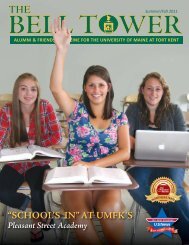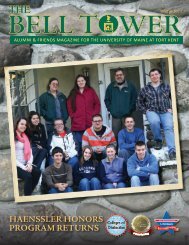BUILDINGCOMMUNITYIN FRANCEBY LUKE ZAKAs would be expected as quidditch becomes a trulyinternational sport, the passion and dedication weall share has continued to sweep across the Atlanticand found a home in France. What started as asmall community effort to bring some of the magicalive has now led the nation to developing one of the most prominentquidditch scenes beyond the Americas.In January 2011, Elodie Laruelle’s experience with quidditchbegan much in the same way as her American counterparts. Shediscovered videos of muggles running around with brooms onthe Internet and became immediately enthralled. Straight away,she started forming a team in her home town of Nantes, France.Thankfully, with some lengthy correspondence, I was able coordinatemy spring break travel plans so that I could attend the team’sfirst-ever practice in May. Start-up supplies in tow, the first Frenchquidditch team convened at the Parc du Grand-Blottereau. All ittook was that one day to get a group of people together who werecommitted to the future of the sport in France.From then, local interest continued to grow and the programgarnered official recognition, establishing itself as a student associationat Nantes University in January <strong>2012</strong>. They weren’t longthe sole French team. Organizations from Paris and Lesparre-Médochave cropped up over the last year, joining ranks with NantesQuidditch. Anthena Quidditch, the team from Lesparre, soon becamethe first French IQA official member team, followed not longafter by Nantes and Paris. Additionally, another unofficial team hasformed in Toulouse.Naturally, with so many teams, a tournament was in order! Lastfall, Anthena Quidditch hosted the first muggle quidditch tournamentto take place on French soil. Called the 1er Tournoi de Quidditchde Lesparre-Médoc en Gironde, the event brought togetherathletes from across the country to face off in quidditch, unprecedentedin this country. Nantes and Toulouse Quidditch mergedteams and took a solid second place, just behind Les Spartiates,one of the teams from Anthena Quidditch, who clenched the historicaltitle. More important than the competition, though, was thealignment of aspirations for the future of international quidditch.After making new connections, the teams returned with a sense ofthe importance of creating lifelong relationships through the sport,promoting the growth of quidditch, and passing on the passion.Perhaps the most notable example of these new teams’ drive toconnect with athletes beyond France is Nantes Quidditch teamcaptain Elodie Laruelle’s desire to create international quidditchfriendships. This past March, she hopped on a transatlantic flightto visit her new francophone friends in Canada. There, Laruellesays that she had the chance to “meet McGill Quidditch and UOttawato improve her skills and create quidditch friendships.” Nowshe is continuing this effort as she will be traveling to Oxford thisJuly to compete in the IQA Summer Games on the France nationalquidditch team against the United States of America, theUnited Kingdom, and Australia, with teammates who have beenpulled from all three official French teams.With all of the developments in French quidditch, there is evenmore exciting news on the European front. Now, thanks to theassociation in Nantes, two more teams have started up: Isère/BourgoinMuggle Quidditch in France and even a team in Switzerland,Nyon Quidditch! Set on spreading the quidditch word, NantesQuidditch is going as far as to organize a Quidditch Camp July 14and 15. Lastly, every athlete in our sport knows that the best way toensure the future of quidditch is to invest in the youth.Ever since a wide-eyed kid ran over to the newly assembled teamsetting up a pitch with three hoops on each end in May of lastyear and inquired with bewilderment what game we were playing,the members of Nantes Quidditch have recognized the possibilitiesof giving children the chance to experience quidditch. CaptainLaruelle discussed the outreach initiatives her team has engaged insince the team’s creation, stating, “This team is also very involvedin teaching quidditch to children. They work with some leisurecenters to promote the sport among young people.” After havingorganized kidditch workshops on February 15 and 22 and April 13and 17, her team has decided to take the next step in involving theyouth of the community. “Nantes Quidditch will open one or severalkidditch teams for children aged 6-14 years old in September<strong>2012</strong>,” she explains.All in all, the growth of quidditch over the past year in Francehas been indescribable. One thing is certain, however. This countrywill be a force to be reckoned with in the near future of quidditchon a world-wide scale as the number of teams continues to escalateand the love of the game is sown into their communities. Vive laFrance! nLuke Zak is the IQA’s Midwest Regional Director and a <strong>2012</strong> graduate of the University of Minnesota, where he founded one of the most successful quidditchprograms in the United States, bringing them to World Cups IV and V and the Spring Champions Series in Boston.26 Quidditch Quarterly • Summer <strong>2012</strong>ABOVE: NANTES QUIDDITCH AT THE FIRST FRENCH TOURNAMENT. (PHOTO: COURTESY ELODIE LARUELLE)
QUIDDITCHIN HARRY POTTER’SHOMELANDBY KATHLEEN RICHTERWith the Summer Olympicscoming up,many in the quidditchworld are understandablygetting revved upabout sending their nation’s respective teamto London—but what about the teams thatare already there?While according to the IQA there are 33teams in the UK, only one of them—justrecently—has become an IQA official team:the University of West England (UWE) inBristol. Chris Holgate, team captain, saidthe move was a way “to add credibility towhat we do,” as even in the home of HarryPotter, the sport is often approached withskepticism.“The initial response was more than oftena strange mix of surprise, laughter, and ‘areyou serious?’” said Holgate, talking about apresentation he did for UWE’s Sports andSociety Council. Once he showed themYouTube clips featuring the sport, “manyseemed to warm to the idea, especiallywhen sports individuals saw how it was likea sport like any other.”As for UK teams in general, “quidditchis overall the same here in the UK [as itis in the US],” according to Kyrie J. Timbrook,who has played quidditch on a USteam (the Silicon Valley Skrewts) and ona British team (Kingston University). “Oneof the main differences is that they’re stillbuilding up steam…In the UK, there are sofew teams that it’s been difficult for themto play each other. At Oxford they get lotsof people because different universities inOxford have teams. However, they play bytheir own set of rules.”“Though I can’t speak for all UK teams,”Holgate said, “a lot of those interested inquidditch here are openly ‘nerdy,’ wheresport wouldn’t be the first port of call...After seeing many of the U.S. teamsplaying it, we feel we may never takeit as seriously as them, to the extent ofexcluding the full-contact aspect of itto make it more appealing to potentialmembers.”Robert Barringer, from Keele University,noted that though the sport iseven newer in England than it is in the US,it has the potential to become just as popular—andas athletically competitive—as itsiteration in the US. “Comparative to theUS, the UK is a very dense island (realistically),so it’s easy for a craze to spread overthe country and encompass the nation, “ henoted, citing the fact that in just six months,the Quidditch UK network (QUK, pronounced“qwuk”), has grown to just under150 people, and that some schools have alreadyadded quidditch totheir physical education curriculum.“It’s a waiting game currently,” Holgatesaid about the future of quidditch in theUK. As many schools are now out for the<strong>summer</strong>, there’s not much that can be done.“But when we come back we’re hoping tobe in contact with both the IQA and ourlocal quidditch enthusiasts who’ve contactedme to organize games and whatnot andreally get this put onto the map!” nKathleen Richter started playing quidditch when she found it through Meetup and thought, “zomg must play NOW.” She now co-captains the Silicon Valley Skrewtsand spams the IQA West Facebook page as often as feasible.ABOVE: KEELE UNIVERSITY QUIDDITCH. (PHOTOS: LEFT COURTESY MELANIE PIPER; RIGHT TOM CRAVEN)Quidditch Quarterly • Summer <strong>2012</strong> 27
















